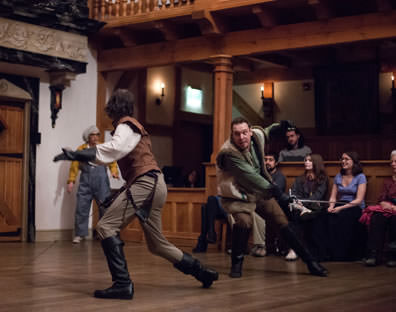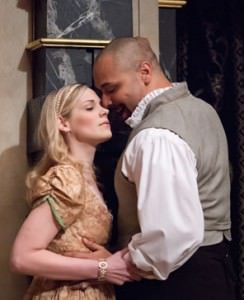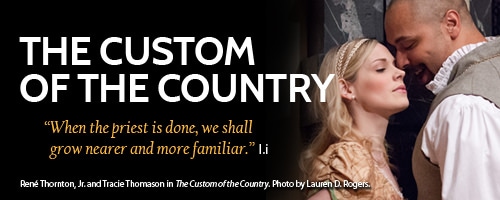This morning I read an article in The Washington Post that helped me understand why the American Shakespeare Center in Staunton sometimes devotes its prodigious talents to plays that aren’t as hot as its actors, like The Custom of the Country: they do it to show that we resemble our ancestors more than we differ from them. In spite of Twitter. In spite of nuclear physics. In spite of Keurig coffee machines and everything else the human race has achieved since 1619, when that play was first staged in London’s original Globe Theatre.

The custom in question is the exercise of jus primae noctis, as the Roman poet Horace called it, or the droit de seigneur d’avoir la cuissage, as the medieval French were supposed to have called it: the lord of the manor’s right to the thighs of of his female subjects on the first night of their lives as married women. In the opening scene of the play, two brothers argue opposing perspectives on that custom:
“Why are you still grieving,” Rutilio (Benjamin Curns) asks, and Arnoldo (Grant Davis) answers that even a man of marble would melt if he had to endure Arnoldo’s dilemma, which is that he’s in love with the beautiful Zenocia (Tracie Thomason), and she wants to marry him.
“Everyone should have such problems,” Rutilio responds.
“You do not or else you purpose not to understand me,” Arnoldo says. “They have a custom in this most beastly country…that when a maid is contracted and ready for the tie of the church, the Governor must have her maiden-head, or ransom it for money at his pleasure.”
Rutilio thinks that’s nice work if you can get it, and the play gets its energy from the tension those opposing attitudes create — because they dwell in each of us to some degree.
Of course, complication ensues. Zenocia’s father reveals that the governor in this case would like to marry Zenocia, not just harvest her first fruit, and Zenocia’s so beautiful that if she marries the governor he won’t want any other women, so he’ll suspend the wicked custom — if it is in fact wicked, or even really a custom: if it’s merely a myth that Western Civilization has perpetuated since the days of Horace, what does its perpetuation say about the idea? And about us?
Zenocia is far too noble to sacrifice the treasure of her maidenhead to anything but true love, the greater good be damned! And we’re supposed to like her for that? What makes that attitude noble?
It gets more complicated still when Count Clodio appears and expresses his desire to “grow more familiar” with Zenocia, because Rene Thornton, Jr., who plays Clodio, is eye-candy — handsome, bold, and charismatic, much the more attractive fellow than the little guy with whom Zenocia runs away from the governor’s bed.
In other words, the beautiful woman could marry the rich and powerful and handsome man who wants her, thereby raising her family’s status and liberating all the other virgins in the land from the terrible fate from which she herself is about to run away, but instead of doing that she runs away with a little guy who has a funny chin.
No wonder they wind up shipwrecked.
The play was written by John Fletcher and Phillip Massinger, who were resident playwrights at The Globe after Shakespeare died, but it was rarely staged, perhaps because John Dryden condemned it as dirtier than all the other plays of his day put together. What struck Dryden as intolerably dirty may have been the play’s suggestion that some women like sex as much as some men — so much that they’re willing to pay for it. In the play’s most memorable scene, Rutilio has escaped from the brothel where he has been impressed to serve at the pleasure of Lisbon’s lusty women, who have left him so chapped and exhausted that he can’t pull up his pants. Abbi Hawk’s performance as Sulpitia, the owner of that brothel, and John Harrell’s performance as Zabulon, her Jewish talent scout, show that great actors can make mountains out of molehills.
ASC Artistic Director Ralph Cohen says the play has not been fully produced in more than 200 years, though the curators of the new Globe Theare in London recorded a staged reading of the play in 1998. The current production, one of three in ASC’s Actors’ Renaissance Season, “should help remind us that it’s a fine play,” Cohen says.
Or at least a relevant play, despite its bizarre archaic premise — that the Lord should get to harvest female subjects when their fruit matures, just as he gets his cut of every other crop the lowly manage to produce.

Or because of its premise, which turns out not to be archaic after all. One of the cases that finally came before the Supreme Court this week is rife with parallels to that custom. Edith Windsor has asserted, in effect, that the Lord of the American manor ransomed her maidenhead for money at his pleasure, as Arnoldo says, when he took $360,000 from the estate of Thea Spyer, who was Windsor’s wife. The two women lived together as committed domestic partners for forty years, during which time Lord America capriciously refused to let them marry one another, so in 2007 they ran away to Canada, where they were allowed to marry whom they pleased. In 2009, while residing in the state of New York, Spyer died and left her estate to her wife, her estate from which Uncle Sam claimed the right to harvest his capricious cut because Spyer was a woman, not a man.
Legitimate governments should have no more claim on a woman’s fruit than on a man’s, Windsor contends. Fletcher and Massinger would seem to agree.
The Custom of the Country plays through April 6, 2013 at Blackfriars Playhouse – 10 South Market Street, in Staunton, VA. Purchase tickets online, or call the box office 1-877-MUCH-ADO or 540-851-1733. Here are directions.
LINKS
The cast and creative team.
A synopsis: Things Happening in the Play.





